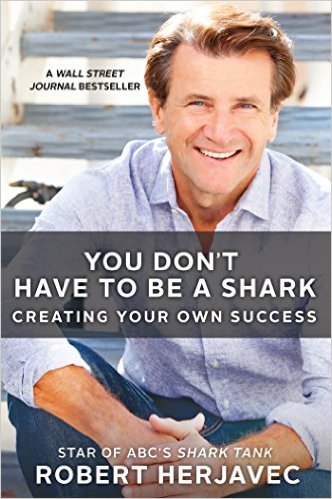INSIDER: You Don't Have to be a Shark
Luke Smith, MBA Candidate
 Salesperson. To some, the word invokes thoughts of horror – high-pressure trickery, long-winded conversations, and flashy showrooms. For others, the thought of a salesperson is desirable – a welcome friend while making a difficult decision encompassing many variables. Yet one fact rings true, no matter the perception – sales is as much about the experience as it is about the price and performance of the product being sold.
Salesperson. To some, the word invokes thoughts of horror – high-pressure trickery, long-winded conversations, and flashy showrooms. For others, the thought of a salesperson is desirable – a welcome friend while making a difficult decision encompassing many variables. Yet one fact rings true, no matter the perception – sales is as much about the experience as it is about the price and performance of the product being sold.
Noted Idea Man Bob Hooey said it well: “If you are not taking care of your customer, your competitor will." Sales isn’t a one-and-done profession. It’s a continual building of relationships with customers, a constant gleaning of knowledge, and a concerted effort each day in order to be successful. But, despite popular opinion, sales doesn’t require a unique personality or an aggressive attitude.
In his book You Don’t Have to Be a Shark, Shark Tank’s “nice shark” Robert Herjavec seeks to provide techniques for salespeople to sell themselves effectively, leveraging their greatest asset (themselves) in their daily life. For Robert, his self-described challenging past confirmed that “great salespeople are made, not born, and no one achieve success in life without knowing how to sell.”
THINK POINT #1: Everybody is Selling Something
If you stop and think about it, sales involves two key actions – understanding the customer’s need and ensuring that the customer considers your side of things before taking appropriate action. Every day, salespeople twist this concept, relying upon coercion and manipulation to make sales. This not only perpetuates the bad “salespeople” stereotype but is also much less effective.
In 1936, Dale Carnegie published a book entitled How to Win Friends and Influence People. Even today, the book remains in print and has sold more than 20 million copies. The book – containing chapters such as “Fundamental Techniques for Handling People” among other people-focused titles – explored an interesting idea. According to Carnegie, it’s possible to “change other people’s behavior by changing one’s behavior toward them.”
When meeting a client for the first time, a real estate professional must take the time to explore the client’s needs and desires. Asking clear, thoughtful questions can make a big difference in forming the relationship. The questions, however, must revolve around the buyer, not the seller. Consider the following questions:
How do you plan to use your new house?
How many bedrooms would you like the house to include? Bathrooms?
Do you prefer to live in the city or in a suburb?
While simple, these questions will trigger new questions and eventually allow the seller to locate a home that meets the needs of the client, along with some extra features that may prove to be the “selling point” of the home.
Ultimately, by taking advantage of a qualifying session, real estate professionals can create exceptional buyer-seller experiences and ultimately prove more successful in their sales pursuits.
THINK POINT #2: Be Honest. Your Clients Will Thank You
For Robert Herjavec, finding a career was a struggle. After studying accounting in high school, Robert dropped his accounting major after only one semester. Instead, he studied English literature with a minor in political science – a far cry from the business major where he began.
Following college, Robert’s first job was with a collection agency. Seeing his colleagues struggle with collecting bad debts through pressure techniques, Robert experimented with his sales knowledge to great success. Robert sold his “clients” on the idea of paying even a portion of their debt. After all, 20 percent collected was better than nothing. Building relationships in the process, Robert eventually became one of the most successful collectors in the company’s history.
Of course, as a real estate professional, you won’t be calling clients to collect bad debts. However, you will be spending countless hours preparing for meetings with your clients and showing them homes. Telling the truth at all times is essential. You may be tempted to let your clients down easy (when their dream house deal falls through) or to show them an expensive home (that’s outside their price range in pursuit of higher commissions). However, in the process, you rob your clients of their time and tarnish your reputation.
As Robert describes, agents must avoid “happy ears” – hearing what you want your client to say when they mean the opposite. Clear, honest communication is key to successful relationships.
THINK POINT #3: Continually Work to Develop Your Best Traits
Some may argue that successful salespeople are born, that it’s in their DNA. For Robert, this idea is flawed for many reasons. Instead, training and enthusiasm play a major role in the accomplishments one may reach.
Far from being a dancer, Robert chose to join Dancing with the Stars and promised himself he would work hard, learn something new, and enjoy himself. Ultimately, he learned basic steps that eventually led to much larger, more advanced steps.
Whether you’re hiring a new agent for your office or reflecting upon your experiences, Robert identifies four important traits found in good salespeople:
- They believe in what they do. No matter the organization, top salespeople are valuable. Without them, the organization loses its ability to reach customers. Real estate professionals play an invaluable role in helping clients find homes and turn a very complicated process into a much more bearable experience.
- They enjoy the company of people. Sales is not an individual sport. More often than not, salespeople find themselves relying upon others for knowledge and connections. Similarly, real estate professionals spend an exorbitant amount of time with people and build close relationships throughout the process. Without a love for the company of others, agents will likely fall short.
- They spend more time listening than talking. The cliché is true: we are born with two ears and one mouth for a reason. For agents, listening is essential. However, agents must be careful to listen to how things are said and what is not being said. In some cases, these intricacies can say more than what the words alone demonstrate.
- They make the connection between selling skills and life. Robert reminds readers that the most important thing you will ever sell is yourself. Fitting for real estate professionals, this advice should remind agents of a key idea. No matter how much detail clients try to absorb before making a buying decision, their ultimate choice will be made based upon a combination of their heart and mind. Emotion will always tip the scales.
No matter the challenge, successful salespeople put their best feet forward and seek to hone their skills constantly.
THINK POINT #4: Employ the 80/20 Rule
You may have heard of the Pareto Principle named appropriately after Vilfredo Pareto. While researching property ownership in Italy, Pareto discovered than 20 percent of the population owned 80 percent of the country’s land. Just a few days later, Pareto noticed that 20 percent of the pea pods in his garden produced 80 percent of the peas. Digging further, Pareto found that the 80/20 ratio appeared in economics, biology, politics, and other unexpected locations. Ultimately, he calculated a formula stating the following:
“Eighty percent of the effects of any activity comes from 20 percent of the cause”
In other words, eighty percent of a company’s business is made from 20 percent of its customers.
Armed with this tool, real estate professionals can determine how best to maximize their productivity – and their profits. For example, instead of spreading yourself so thin that you are unable to provide personalized attention to all of your clients, consider seeking out the 20% who are most likely to purchase a home. Spend 80% of your time on those clients and the payoffs will likely be great.
THINK POINT #5: Close the Sale... Carefully
 For most people, purchasing a home is the single largest purchase they will make in a lifetime. Rightly so, it isn’t uncommon to experience anxiety, ask many questions, and get cold feet, possibly. Closing a sale properly becomes essential to calming those concerns as an agent – and can lead to future business and referrals.
For most people, purchasing a home is the single largest purchase they will make in a lifetime. Rightly so, it isn’t uncommon to experience anxiety, ask many questions, and get cold feet, possibly. Closing a sale properly becomes essential to calming those concerns as an agent – and can lead to future business and referrals.
As Robert notes, “people want to buy; they don’t want to be sold.” While salespeople and customers know their roles, there’s no doubt that customers prefer to buy from people they can relate to and trust. Thus, when closing the sale, it becomes essential that agents tread carefully and avoid pushing too hard. Injecting a closing line into the conversation too early can lead to an abrupt halt to the process. Too late and you may lose the sale completely.
The experience of a skilled salesperson is much like that of a parent. No matter how many parenting books you read or child psychologists you encounter, in the end being a good parent comes down to knowing your child and using your instincts to reach your goals.
For first- or second-time homebuyers, the idea of picking a house can be daunting. As an agent, suggesting “What happens next?” may be the simplest way to encourage movement in the direction of signing a contract. This technique turns the closing situation back to the buyer. Subsequent follow-up questions can organically flow from that starting question – “When would that decision be made?”
Successful closing is a skill and it comes with practice. However, the most successful closers are those who control the direction of the process while allowing buyers to think they came up with the idea all along.
Conclusion
From humble beginnings, Robert Herjavec became an extremely successful businessman. His success, however, was not because of an innate sales genius but instead grew out of a willingness to try new things and never give up. For real estate professionals, daily challenges can be met with confidence knowing their work is beneficial to their clients. By remembering they are their greatest asset, a real estate professional can propel his or herself to new heights and open up new opportunities.
. . . . . . . . . . . . . . . . . . .
Recommended Reading
Herjavec, Robert (2016), You Don’t Have to be a Shark: Creating Your Own Success, New York, NY: St. Martin’s Press.
. . . . . . . . . . . . . . . . . . .
About the Author
Luke Smith, Healthcare MBA Candidate
Baylor University
Luke is a graduate student from St. Louis, Missouri. He earned a Bachelor of Business Administration degree in Economics from Baylor University in 2014. Before beginning graduate school, Luke served as Special Assistant to the President at Baylor University. Luke is seeking an MBA degree with a concentration in healthcare administration and currently works as an Administrative Resident for Kaiser Permanente Health System in San Francisco, California.